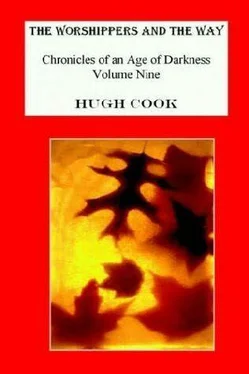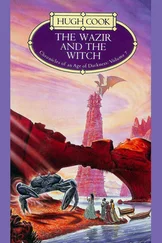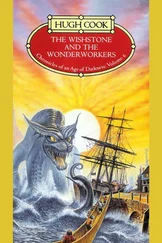Hugh Cook - The Worshippers and the Way
Здесь есть возможность читать онлайн «Hugh Cook - The Worshippers and the Way» весь текст электронной книги совершенно бесплатно (целиком полную версию без сокращений). В некоторых случаях можно слушать аудио, скачать через торрент в формате fb2 и присутствует краткое содержание. Жанр: Фэнтези, на английском языке. Описание произведения, (предисловие) а так же отзывы посетителей доступны на портале библиотеки ЛибКат.
- Название:The Worshippers and the Way
- Автор:
- Жанр:
- Год:неизвестен
- ISBN:нет данных
- Рейтинг книги:4 / 5. Голосов: 1
-
Избранное:Добавить в избранное
- Отзывы:
-
Ваша оценка:
- 80
- 1
- 2
- 3
- 4
- 5
The Worshippers and the Way: краткое содержание, описание и аннотация
Предлагаем к чтению аннотацию, описание, краткое содержание или предисловие (зависит от того, что написал сам автор книги «The Worshippers and the Way»). Если вы не нашли необходимую информацию о книге — напишите в комментариях, мы постараемся отыскать её.
The Worshippers and the Way — читать онлайн бесплатно полную книгу (весь текст) целиком
Ниже представлен текст книги, разбитый по страницам. Система сохранения места последней прочитанной страницы, позволяет с удобством читать онлайн бесплатно книгу «The Worshippers and the Way», без необходимости каждый раз заново искать на чём Вы остановились. Поставьте закладку, и сможете в любой момент перейти на страницу, на которой закончили чтение.
Интервал:
Закладка:
As soon as Hatch had escaped from Gan Oliver's office, he was accosted by Lupus.
"What did he say?" said Lupus. "What did he say?"
"It's a deal," said Hatch. "That's what he says. But only – Lupus, it's in your hands now. He's wants you to call off your plans for this – this marriage with my sister. He thinks I can talk some sense into her head, but – Lupus, I can't. Only you can persuade Penelope that – well. Will you do it?"
"I'd rather die," said Lupus defiantly.
"You'd rather die?" said Hatch, somberly measuring the weight of the words. "You'd rather die? Then… Lupus, my friend, it may well come to a matter of dying before we're through with each other."
With that half-veiled threat, Hatch departed from the Brick and turned his steps toward Cap Uba, the Frangoni rock.
As Hatch was climbing the Frangoni rock on the way to his home, he was met by Son'sholoma Gezira and half a dozen of Son'sholoma's supporters, each of them carrying a lantern suspended from a stick. Like the cheap and primitive oil lanterns of the buffalo carts, these were powered by the grease of the slunk, and stank with a similar stench like unto that of the burning of a woman's crowning beauty.
"What do you want?" said Hatch, wondering why he was thus being accosted by those who were preaching the alien doctrines of Nu-chala-nuth in the city of Dalar ken Halvar.
"Just to give you a little news," said Son'sholoma.
"What news?" said Hatch.
"Your daughter Onica has mortgaged herself to the moneylender Polk," said Son'sholoma.
"Get out of my way," said Hatch.
"Hatch," said Son'sholoma, "you're bitterly in debt, and – Hatch, Nu-chala-nuth is the death of all moneylenders."
This is one of the claims almost inevitably made by any revolutionary movement, whether the rhetoric of that movement be religious, or racial, or ideological, or a combination of all three. Every society has its moneylenders, and every society has a half-acknowledged hatred of those moneylenders; and, while most citizens would claim that they are opposed to robbery on principle, one of the great attractions of revolution is that by the overthrow of moneylenders and the cancellation of debts it effectively allows a great mass of citizens to realize the longdesired opportunity to rob a bank.
"My blade is at the command of my emperor," said Hatch soberly, "and I do no killing for cash."
"Hatch," said Son'sholoma, "Hatch, it's your daughter, I've spoken in truth. Polk holds a mortgage. Do you surrender your daughter? Do you make her your sacrifice to – what? The law? What law? What law is it that makes slaves and rules by murder? Hatch, we need your support."
Hatch hesitated. Manfred Gan Oliver had spoken of a possible revolution. If there was a conspiracy afoot, then Hatch had a duty to find out about it.
"We?" said Hatch. "Who is this we?"
But all possibility of discussion was aborted when an officer of the Imperial Guard came up the path. Son'sholoma Gezira and his companions fled, peltering away with a slap-slap of sandals.
"Hail and well met," said Toto P'wara, the officer in question.
"S'nufta sna," said Hatch, voicing a reciprocal greeting.
"Who was that?" said P'wara. "Was that Gezira?"
"It was Son'sholoma, yes," said Hatch. "I think he's been out in the sun too long, he's – but if you'll excuse me, I have to get home. I've bad news of my house."
"Your wife…?"
"She lingers. But my daughter – I'm terribly afraid that she's done something very very foolish."
And with that Hatch hastened home, in fear and trepidation, wondering if it was true, if disaster had really befallen his house, if his daughter Onica had really and truly mortgaged herself to the noseless moneylender Polk the Cash.
Chapter Nine
The Caps: the Great Rocks of Dalar ken Halvar, the minor mountains which arise from the flat red dust of the Plain of Jars and dominate the landscape.
There are five Caps. On the city's southern border lies Cap Foz Para Lash, home of the Combat College. On the city's western flank, Cap Uba, the Frangoni rock. North of Cap Uba and south of the fishflesh quarter of Childa Go stands Cap Ogo Botch, on which is built the palace of Na Sashimoko. East of Na Sashimoko stands the elite residential area of Cap Gargle. Further east, on the far side of the Yamoda River, stands the steep-scarped double-headed mass of Blogo Zo, which is universally counted as one of the Caps even though its Capless name has led some foreign geographers into denying its status as such.
Yamoda's ashes die In the Weather of Never, So I must live by perishing:
Eating the dust of the Plain of Jars,
Sleeping in the bones of the sun.
In Dalar ken Halvar's wormlight dark, the Frangoni warrior Asodo Hatch made his way homeward, journeying through the familiar dooms of night to House Takabaga, his home atop the Frangoni rock.
At the door to House Takabaga, Hatch was met by Scraps, the small white dog which the Lady Iro Murasaki had given to Onica on the day of the funeral of Hatch's father. Hatch entered House Takabaga, a humble place with walls of interwoven split bamboo and a roof of similar make, with floors of beaten earth and the simplest of bamboo furniture.
"Onica?" said Hatch.
"She is not here," said Talanta, emerging from the backroom which served as a combination storeroom and kitchen. "She thought you'd be angry."
Hatch observed the studied expressionless features of his wife's face. She had made her face a mask which hid both her growing pain and her true emotions. They had become estranged from each other in these last six months. Faced with the fact of his wife's worsening illness, Hatch had withdrawn from that fact, spending more and more time in the Combat College, not just training but over-training. Or, sometimes, sitting alone in a paralysis of indecision.
"So it's true," said Hatch.
So his daughter Onica really had mortgaged herself to the moneylender Polk to buy peace for her mother. In the face of this disaster, Hatch found himself unnaturally calm. It was the calm which came upon him when he had decided to kill someone. As yet, he was not quite sure who he was going to kill – himself, his daughter, the treacherous moneylender, or all three. But someone was going to die for this, that was a certainty.
"She did it," said Talanta, "she did it because – because she thinks you could do more."
Could Hatch have done more? And could he yet? Maybe. He just didn't know.
Talanta spoke into his silence.
"There is fish," said Talanta.
"Thank you," said Hatch. "I will eat."
So Talanta went to the kitchen and shortly reappeared with a dish on which catfish was arranged with steamed polyps and baked yams. Hatch ate slowly, too tired to make smalltalk, too tired to ask any unnecessary questions. Talanta knew his moods, and let him eat without interruption.
From time to time, Hatch raised his eyes from his meal and studied his wife. Was she in pain? Right now? Or had she taken the peace? He could not tell. She had learnt to hide the pain. But certainly the pain was growing worse, and it would become an unspeakable torture, for Talanta was dying of pancreatic cancer.
This at least was the opinion of Paraban Senk, the Combat College's Teacher of Control, to whom Hatch had submitted a detailed account of his wife's history and symptoms.
And in the face of that illness – The Frangoni warrior Asodo Hatch, he who was every forward in battle, he who had often killed casually and who claimed to have no fear of dying himself, was hard put to endure the drawn-out suffering that his wife endured, and to contemplate the living death which yet awaited her. He was glad, in a way, that the need to pay for her peace forced him to ruthlessly prosecute his own career in the Combat College, and so compelled him away from her presence.
Читать дальшеИнтервал:
Закладка:
Похожие книги на «The Worshippers and the Way»
Представляем Вашему вниманию похожие книги на «The Worshippers and the Way» списком для выбора. Мы отобрали схожую по названию и смыслу литературу в надежде предоставить читателям больше вариантов отыскать новые, интересные, ещё непрочитанные произведения.
Обсуждение, отзывы о книге «The Worshippers and the Way» и просто собственные мнения читателей. Оставьте ваши комментарии, напишите, что Вы думаете о произведении, его смысле или главных героях. Укажите что конкретно понравилось, а что нет, и почему Вы так считаете.












